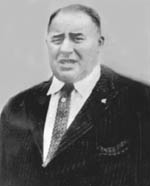Clan Maxwell Society
Celebrating the Scottish Heritage of Maxwells and their Allied Families
Adair • Blackstock • Dinwiddie/Dinwoodie/Dinswoodie • Edgar • Herries • Kirl • Kirkland • Latimore/Latimer • MacKittrick • Maxton • Monreith • Moss • Nithsdale • Peacock • Pollock/Pollok • Polk/Paulk • Rawlins • Sturgeon • Wardlaw
THE MAXWELL AWARD
College Football Player of the Year


Few honors for college football players can rival one which bears the Maxwell name: the Maxwell Award for College Player of the Year. The award is presented each year by the Maxwell Football Philadelphia, a group dedicated to helping young people realize their fullest potential as leaders through football at all levels.
Both the club and the award are named in honor of Robert W. (Tiny) Maxwell, one of football’s legendary heroes. Tiny, whose nickname resulted from his size — 6’4” and 240 lbs. — began playing college football at the University of Chicago in 1902 for Amos Alonzo Stagg, and he had a major impact on the game of football as we know it today. Much of that impact resulted from a photo taken after a savage 1905 game in which Tiny’s customary stellar performance came at quite a physical cost. A newspaper photo taken just after the final whistle showed the Maxwell with his nose broken, eyes swollen nearly shut, and face closely resembling steak tartare. President Theodore Roosevelt saw the picture and was so shocked that he threatened to ban football outright if the game was not cleaned up immediately. Within three months, rules were changed to double the yardage for a first down from five to ten, reduce games from seventy minutes to sixty minutes, add restrictions against roughing, establish a neutral zone on the line of scrimmage the length of the football, and to legalize the forward pass.
After college, Tiny played briefly as a professional for the Massillon Tigers and Canton Bulldogs, then he began a career as a referee when he was called at the last minute to fill in for an official who didn’t show up. He was soon in demand for such major college games as Harvard-Yale and Army-Navy, and his Philadelphia apartment became a gathering place for fellow officials. The first first formal association of football officials in the East grew out of those meetings.
Tiny Maxwell was also one of the first athletes to make the leap from field to press box. In 1914, he began writing a sports column for Philadelphia’s Public Ledger and, two years later, became Sports Editor of the Evening Public Ledger, a position he held until his death.
Maxwell was only 37 when he died of complications stemming from an automobile accident. To honor his memory and many contributions to football, the Robert W. Maxwell Memorial Football Club was founded in 1937 to present awards in his name and to promote football safety.
The great newspaper columnist of that period, Damon Runyon, summed up the opinion many held of Maxwell: “He was, physically , such a tremendous man because nature had to make provisions for the housing of his great heart.”
Copyright © 2001 — 2023 | All Rights Reserved | Maxwell Writers Group
Site design KWGraphicsandWeb